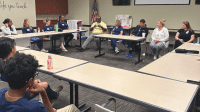For many nurses, perhaps the most profound and memorable experience is getting their first paid nursing position. Early in my career, I worked in staff development; the department’s central activity was orienting nurses to their first position. While we pursued active learning opportunities for nurses throughout their orientation, we spent much of our time exposing them to how the nurse functions at work by reviewing, drilling, and checking off compliance with policy, procedures, and hospital-based routines.
Later, I realized we didn’t foster a stronger sense of how to be a nurse. We didn’t take the time to explore orientees’ personal calling to the profession, aid their understanding of advocacy and vigilance on the patient’s and family’s behalf, or navigate hospital structures and politics. We left these things for each nurse to discover.
Much later, I was part of a Robert Wood Johnson Foundation project called Wisdom at Work: The Importance of the Older and Experienced Nurse in the Workplace. One issue we explored was senior nurses’ pervasive concern about newer nurses’ engagement in critical thinking. As we investigated, we discovered several perspectives: Some senior nurses believed new nurses don’t act on their critical thinking with confident expediency. Others perceived new nurses as less able to deal with complex human and communication dynamics among patients, families, physicians, and other healthcare team members. Still others thought new nurses lack abilities and insight into the need to navigate the organization’s political waters to get things done, including being an effective patient advocate. Some senior nurses lamented that many novices aren’t authentically present in synchronous moments that mark the onset and end of a patient’s life, or other intimate moments patients face during illness and rehabilitation. Some said they lack insight into the patient’s life trajectory beyond the hospital walls—for example, failing to imagine the patient beyond the intensive care unit.
IOM recommendation
In The Future of Nursing: Leading Change, Advancing Health, a 2010 report from the Institute of Medicine, a specific recommendation culminated from a growing body of jury-reviewed evidence—that nurses should have the benefit of a residency program at the start of their careers and during career transitions. I applaud this recommendation and praise the results of a growing number of residency opportunities—most notably the program co-developed and evaluated by the University Hospital Consortium and the American Association of Colleges of Nursing (AACN).
The need for a residency program doesn’t reflect failure on the part of nursing schools. It reflects the complexity of nursing as the sole discipline to acknowledge the patient in the context of family and community. Excellent nurses have the knowledge, skills, and abilities to engage with the patient and family through holistic interventions. Besides providing direct care, they play a central role in connecting the patient to various clinical resources before, during, and after the patient is seen in any one setting. Nurses are the “connective tissue” among care systems—a challenge given the design of the U.S. healthcare system. To augment nursing education programs, nurses need experiences beyond what any one academic setting can provide.
In the 2009 book Educating Nurses: A Call for Radical Transformation, the authors stress the importance of professional formation and call for a radical transformation of nursing education. Formal nursing education as currently structured can achieve only so much. Nurse educators are responsible for framing the foundation for both doing the nurse’s job and being a nurse—for creating a dynamic learning community in various clinical environments. Once students master basic nursing skills, they begin to engage in broader aspects of caring for the patient as a person with family and community roles. A soon-to-graduate student recently told me, “I learned this semester that I can do pretty well handling the patient, but I have many questions about understanding the role of the family and the lack of community structures where this patient came from. That’s my challenge as a nurse, and I hope I’m ready to deal with it when the time comes.”
Residency vs. orientation
A nursing residency program is not a prolonged orientation. Rather, it provides a formal and informal set of learning opportunities that focus on institutional and departmental practices aimed at helping nurses learn the institution’s policies, procedures, and standards of care and introducing them to the key persons and structures needed to execute institutional and departmental routines.
A residency experience complements an orientation program in at least these ways:
- occurs during a career transition
- fosters reflection and exploration of what it means to be a nurse through case review and use of the self as an instrument of healing
- advances communication skills and reinforces the necessity of navigating organizational politics to protect the patient from physical and emotional harm
- creates professional connectivity among intergenerational nurses to ensure that values are passed along and celebrated
- builds confidence by linking critical thinking with critical actions.
Competencies advanced through a residency program
Residency outcomes should link professional development to expanded competencies (beyond those tied to procedural and basic operational skills). Competencies advanced through a residency program should include:
- enhanced use of evidence-based decision making tied to case review
- increased functioning as an advocate for the patient, family, and organization based on real-world experiences
- engagement in crucial conversations that are time-sensitive and bear political risk, to include actual role playing and execution in practice
- expanding leadership through principled action and network building, resulting in a documented and expanded portfolio of leading groups and defined interprofessional cohorts
- projecting a trajectory for individual patient-centered care into the family and community, based on case review and peer review.
Methods for achieving a robust residency experience include peer debriefing, simulation, case review involving management of ethical dilemmas, human and fiscal resource management and optimization exercises, and modeling self-reflective practices. For a residency program to gain momentum, it should have a duration that supports the nurse’s development (such as 6 months or 1 year).
In the future, opportunities may arise to link residency programs with interprofessional opportunities that address complex problem solving to improve patient and family outcomes. These opportunities should be designed not to homogenize the disciplines but to enhance the clarity of purpose each discipline communicates through its specialized lenses, with the goal of solving complex problems with intentional focus.
Ideally, all nurses would participate in a residency at some point in their careers. Currently, most residency programs are institutionally based. But the competencies listed above don’t require that a program be limited to a single institution. Intra-institutional residency programs are worth considering in settings where development resources may be sparse.
Current state of residency programs
The longest-running residency program is that of the University Hospital Consortium and AACN. Other residency programs are being developed in multiple settings, and many nursing membership organizations have plans to structure content and cases for emerging residency programs.
Most residency programs last 6 months to 1 year. Some hospitals offer residency programs for a specified period after graduation and select hires from that graduate pool. Nursing residents are paid less than registered nurses.
In another model, a registered nurse is hired, goes through orientation, and completes the residency program while working. Thus, residency becomes an experience based on real-world experiences gained on the unit and supported through the residency experience. Formal residency programs that are accredited may carry academic credits; thus, they become logical starting points for advancing nurses toward the next academic degree.
Other residency models being tested include those with online components for nurses in rural or frontier areas that lack sufficient peer groups for face-to-face experiences. Nursing schools also may want to consider a residency option for faculty who are needed for practice experiences in new settings. Also, mid-careerists desiring a career adjustment should have opportunities to benefit from residency programs.
When executed with the right intent and a clear focus, residency programs have a strong potential to advance nursing’s contribution to leading change and advancing health through deepening the mission, purpose, and goals of organizations. They can achieve this goal by developing nurses who resonate with transition support that surpasses “doing” nursing to that of being a nurse in the fullest personal sense.
Selected references
Benner P, Sutphen M, Leonard V, Day L. Educating Nurses: A Call for Radical Transformation. San Francisco, CA: Jossey-Bass; 2009.
Hatcher BJ, Bleich MR, Connolly C, Davis K, Hewlett PO, Hill KS. Wisdom at Work: The Importance of the Older and Experienced Nurse in the Workplace. Robert Wood Johnson Foundation; 2006.
Institute of Medicine. The Future of Nursing: Leading Change, Advancing Health. Washington, D.C.: National Academies Press; 2010.
Michael R. Bleich is the Dr. Carol A. Lindeman Distinguished Professor for the School of Nursing at Oregon Health & Science University in Portland, Oregon.



















2 Comments.
I agree to the comment policy
I have developed and implemented an ambulatory RN Residency Program for new RNs and ones new to the specialty. I really appreciated your comments. I implemented many of your key points. The problems, especially in ambulatory is balancing quality and cost. Perhaps we still face an uphill battle re: value.